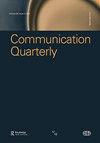How people perceive influence of fake news and why it matters
IF 1
Q2 COMMUNICATION
引用次数: 9
Abstract
ABSTRACT Employing theoretical frameworks regarding people’s perception of media effects (e.g. third-person effect), this study examines how people perceive the effects of fake news, what may lead to these perceptions, and how people act on them. Findings from an online survey provide evidence that people perceive fake news to have negative influence on themselves and others, with greater influence on others than themselves. This study revealed that the extended internal political efficacy scale – the conventional internal political efficacy scale with a measure specific to fake news – serves as an antecedent of the perceived influence of fake news on oneself, others, and the self-other perceptual disparity. Further, the perceptions of fake news effects on oneself and others, separately and jointly, were significantly associated with several likely behaviors including support for fake news regulation, social media withdrawal, and information sharing on social media.人们如何看待假新闻的影响,为什么它很重要
本研究采用有关人们对媒体效应感知的理论框架(如第三人称效应),探讨了人们如何感知假新闻的影响,导致这些感知的原因,以及人们如何对此采取行动。一项在线调查的结果表明,人们认为假新闻对自己和他人都有负面影响,对他人的影响大于对自己的影响。本研究发现,扩展的内部政治效能量表——传统的内部政治效能量表,针对假新闻的测量——是假新闻对自己、他人的感知影响以及自我-他人感知差异的前因式。此外,假新闻对自己和他人的影响的感知,单独或共同,与几种可能的行为显著相关,包括支持假新闻监管、退出社交媒体和在社交媒体上分享信息。
本文章由计算机程序翻译,如有差异,请以英文原文为准。
求助全文
约1分钟内获得全文
求助全文

 求助内容:
求助内容: 应助结果提醒方式:
应助结果提醒方式:


